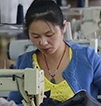Abstract
While women’s share of employment has risen in many countries over the last two decades, they are increasingly excluded from ‘good’ jobs in the industrial sector, and gender job segregation has worsened. In this paper, the determinants of gender job segregation are assessed using panel data for a broad set of developing countries covering the period 1991-2015. The effect of gender job segregation on all workers, via the labour share of income, is also analysed. The results identify two major contributors to gender job segregation—the rising capital/labour ratio and the ratio of female/male labour force participation rates—indicative of ‘crowding’ and exclusion as economies move up the industrial ladder. The analysis further indicates that the crowding of women into lower quality jobs has a negative effect on workers as a whole by dampening the labour share of income. Those processes are influenced by global and macroeconomic conditions and policies that have circumscribed the expansion of high-quality jobs relative to labour supply, intensifying competition for ‘good’ jobs and weakening labour’s bargaining power.



